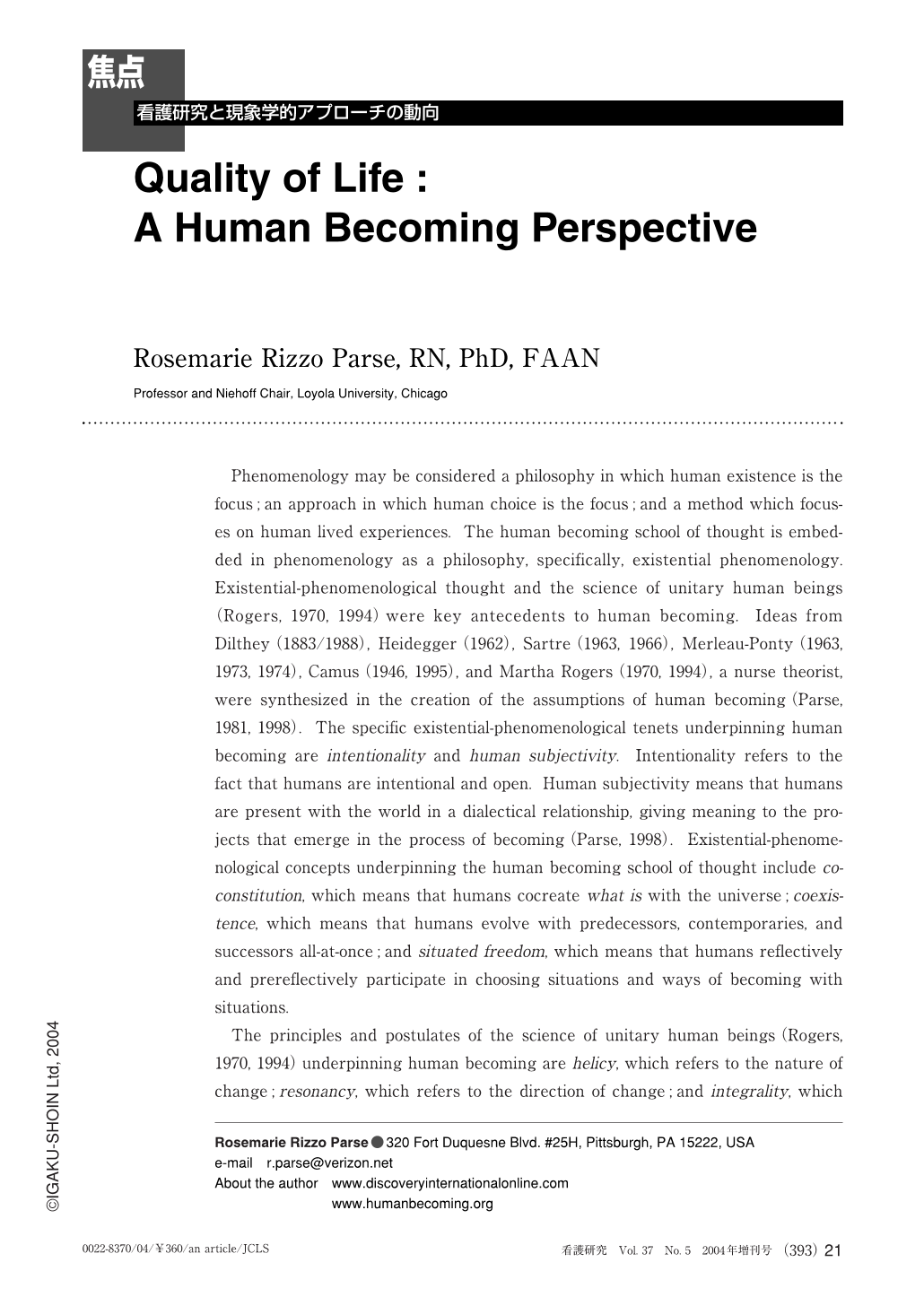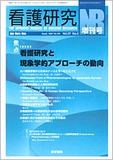Japanese
English
- 有料閲覧
- Abstract 文献概要
- 1ページ目 Look Inside
Phenomenology may be considered a philosophy in which human existence is the focus ; an approach in which human choice is the focus ; and a method which focuses on human lived experiences. The human becoming school of thought is embedded in phenomenology as a philosophy, specifically, existential phenomenology. Existential-phenomenological thought and the science of unitary human beings (Rogers, 1970, 1994) were key antecedents to human becoming. Ideas from Dilthey (1883/1988), Heidegger (1962), Sartre (1963, 1966), Merleau-Ponty (1963, 1973, 1974), Camus (1946, 1995), and Martha Rogers (1970, 1994), a nurse theorist, were synthesized in the creation of the assumptions of human becoming (Parse, 1981, 1998). The specific existential-phenomenological tenets underpinning human becoming are intentionality and human subjectivity. Intentionality refers to the fact that humans are intentional and open. Human subjectivity means that humans are present with the world in a dialectical relationship, giving meaning to the projects that emerge in the process of becoming (Parse, 1998). Existential-phenomenological concepts underpinning the human becoming school of thought include coconstitution, which means that humans cocreate what is with the universe ; coexistence, which means that humans evolve with predecessors, contemporaries, and successors all-at-once ; and situated freedom, which means that humans reflectively and prereflectively participate in choosing situations and ways of becoming with situations.
The principles and postulates of the science of unitary human beings (Rogers, 1970, 1994) underpinning human becoming are helicy, which refers to the nature of change ; resonancy, which refers to the direction of change ; and integrality, which refers to the continuity of change. The postulates are energy field, openness, pattern, and pandimensionality (Rogers, 1970, 1994).
Phenomenology may be considered a philosophy in which human existence is the focus ; an approach in which human choice is the focus ; and a method which focuses on human lived experiences. The human becoming school of thought is embedded in phenomenology as a philosophy, specifically, existential phenomenology. Existential-phenomenological thought and the science of unitary human beings (Rogers, 1970, 1994) were key antecedents to human becoming. Ideas from Dilthey (1883/1988), Heidegger (1962), Sartre (1963, 1966), Merleau-Ponty (1963, 1973, 1974), Camus (1946, 1995), and Martha Rogers (1970, 1994), a nurse theorist, were synthesized in the creation of the assumptions of human becoming (Parse, 1981, 1998). The specific existential-phenomenological tenets underpinning human becoming are intentionality and human subjectivity. Intentionality refers to the fact that humans are intentional and open. Human subjectivity means that humans are present with the world in a dialectical relationship, giving meaning to the projects that emerge in the process of becoming (Parse, 1998). Existential-phenomenological concepts underpinning the human becoming school of thought include coconstitution, which means that humans cocreate what is with the universe ; coexistence, which means that humans evolve with predecessors, contemporaries, and successors all-at-once ; and situated freedom, which means that humans reflectively and prereflectively participate in choosing situations and ways of becoming with situations.
The principles and postulates of the science of unitary human beings (Rogers, 1970, 1994) underpinning human becoming are helicy, which refers to the nature of change ; resonancy, which refers to the direction of change ; and integrality, which refers to the continuity of change. The postulates are energy field, openness, pattern, and pandimensionality (Rogers, 1970, 1994).

Copyright © 2004, Igaku-Shoin Ltd. All rights reserved.


